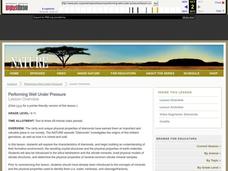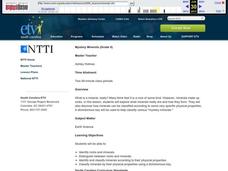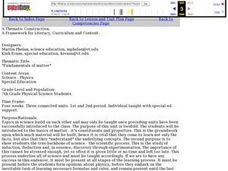Curated OER
Exploring Phases of Matter
Students discuss and experiment with the phases of water. For this phases of matter lesson, students recognize the different states of matter. Students measure and record changes and understand when the state changes.
Curated OER
Water and Ice: Part 1
Learners observe the state changes in water. In this matter lesson, students observe, measure, and describe water as it changes state. Learners explore how water can change from a solid to a liquid then back again. They journal their...
Curated OER
States of Matter
Students explore the states of water. In this physical science lesson, students use ice and dry ice to observe the changes in the state of matter. Students record the results.
Curated OER
What is Matter?
Learners create a definition of matter. In this physical science lesson, students work in pairs to sort items printed on cards into several categories (matter, non-matter, and unsure) and agree on a definition of matter.
Curated OER
Matter
Fifth graders investigate the structure of matter. They examine pictures of atoms and molecules and discuss their relationships, and construct a model of a molecule using toothpicks and gumdrops.
Curated OER
Chemical Composition of American Coins
Young scholars investigate the chemical composition of pennies dated 1983 or later. In this chemical composition of American coins lesson plan, students scratch the surface of the penny to expose the zinc core. They put the penny in...
Curated OER
Comparing Physical and Chemical Properties
In this matter properties worksheet, students complete a Venn diagram by comparing and contrasting physical and chemical properties.
Curated OER
Density as a Unique Physical Property
Students find the density of objects by finding their mass and their volume. In this density lesson plan, students determine the mass of objects, the find the volume by using formulas or by water displacement and they calculate the...
Curated OER
UP AND ATOM
If you are willing to sort through this outline and overlook the portions relating to inaccessible videos, you will find a wealth of support for your introductory chemistry unit. Narrative is presented to help you help learners navigate...
Curated OER
States of Matter
By viewing this PowerPoint your students' understanding of molecular energy should increase. The properties and inter-particular forces are summarized. The logical progression of information is useful, but more data to demonstrate...
Curated OER
Ice Cream Science
Students review properties of matter and discuss how materials change when things are done to them. They observe how materials change as a reaction to temperature by following the procedure to make ice cream and recording the temperature...
Curated OER
Inquiry into Consumer Products
Students recognize different consumer products, found in and around the home, that have reactive or denaturing properties when used together. They explore chemical and physical properties of each product by identifying chemical formulas...
Virginia Department of Education
States of Matter
Scientists have been studying exothermic reactions before they were cool. The lesson begins with a discussion and a demonstration of heat curves. Scholars then determine the heat of fusion of ice and the heat needed to...
Concord Consortium
Molecular View of a Liquid
Pour on the knowledge with an engaging states of matter interactive! Young physical scientists view the atoms within a liquid to explain what gives a liquid its unique properties. The resource allows users to highlight and observe two...
Science Friday
Microorganisms on the Move
You can't b. cereus until you see this lesson! Young microbiologists learn to prepare deep well slides, observe two types of microorganisms, and compare and contrast their physical characteristics in this interactive and lively activity.
Curated OER
Classifying Matter Game
Students identify the different states of matter. In this chemistry lesson, students differentiate the physical properties of the three states. They apply what they learned by playing a team game at the end of the lesson.
Curated OER
Matter And Its Changes
Fifth graders explore the phases of matter, make observations of matter, the physical and chemical properties of matter, solutions and mixtures, formation of molecules and atoms and molecules all through hands on activities.
Curated OER
States of Matter and Chemical/Physical Changes Stations
Learners break into four groups, starting at different stations. Each station should take about 10 minutes depending on prior knowledge of the topic. They then rotate when everyone is finished to the next station and discuss answers of...
Curated OER
Performing Well Under Pressure
Students study the physical properties of minerals and illustrate their functions. In this mineral lesson students construct models of some minerals.
Curated OER
Mystery Minerals
Students minerals and how they form. They investigate the classification of minerals according to physical properties. Students watch a video about mineral characteristics. In groups, students participate in hands-on activities and...
Curated OER
How Does Altitude Relate To Density?
Students demonstrate an understanding of the properties of matter by applying them to density, pressure, and temperature. The educational software program, "Foilsim" is used in this inquiry.
Curated OER
Fundamentals of Matter
Seventh graders explore the the constituents and properties of matter. They use the scientific process while exploring solids, liquids, gases, the mass, volume and density of matter. Students plan and conduct an investigation to measure...
Curated OER
Phases of Matter
Young scholars describe the motion of solids, liquids and gases. In this chemistry lesson, students describe how temperature affect motion of the particles. They determine the physical properties of each phase.
Curated OER
Classification of Matter
Students classify items according to their physical properties. In this chemistry lesson, students define what matter is in their own words. They use the matter diagram to organize different substances.

























